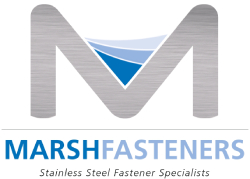Products
Stainless Steel Washers
At Marsh Fasteners, we stock a complete line of stainless steel flat washers, stainless steel lock washers, stainless steel fender washers, stainless steel finish washers, stainless steel SAE & stainless steel AN washers, stainless steel tooth washers (internal & external) and stainless steel bonded sealing washers.
We also have a large variety of stainless steel washers for special applications or can have a special quotation done for specific size requirements (minimums do apply).
Please contact our sales department for bulk pricing, quotations and additional information on our stainless steel washers.
Stainless Steel Washers FAQs
What Is a Washer and Why Should I Use It?
Washers, typically made from plastic or metal, are thin plates with a hole in the center. They are used for various purposes, including:
- Distributing the load of a threaded fastener (nut, screw, or bolt) to prevent damage to the material being fastened.
- Preventing galvanic corrosion by acting as a buffer between dissimilar metals.
- Providing stability and preventing loosening due to vibration in certain applications.
- Available in a wide variety of materials to match specific application needs, including corrosion-resistant and high-durability options.
How Do Washers Help Prevent Corrosion?
Washers made from corrosion-resistant materials, such as stainless steel, provide a protective barrier. Key points:
- Corrosion-resistant washers reduce the likelihood of galvanic corrosion between metals.
- They distribute the load evenly, preventing localized stress that can lead to material degradation.
- Particularly important in harsh, corrosive environments like marine or chemical industries.
Are There Different Types of Stainless Steel Washers?
There are indeed many different types of stainless steel washers. They include stainless steel flat washers, stainless steel lock washers, stainless steel fender washers, stainless steel finish washers, stainless steel star lock washers, stainless steel SAE & stainless steel AN washers, stainless steel tooth washers (internal & external), as well as stainless steel bonded sealing washers.
What Is The Diameter Of A Washer, And Why Does It Matter?
The diameter of a washer, often referred to as the outer diameter (OD) and inner diameter (ID), is crucial to ensure the washer fits the bolt or screw being used. Key considerations include:
- Outer diameter (OD) should match the size of the fastener to distribute the load evenly.
- Inner diameter (ID) should fit snugly around the bolt or screw to secure the connection.
- Proper diameter ensures no damage to the material being fastened.
Should I Always Use a Washer Under the Bolt Head and Nut Face?
Yes, unless you are using flanged fasteners. Key reasons to use washers:
- Washers distribute the load evenly, reducing pressure points on the material.
- They protect the surface from damage and ensure a more secure connection.
- In applications where vibration is a concern, washers help to maintain integrity and prevent loosening.
- Using washers ensures proper fit between the fastener and the surface, providing optimal performance.
What Grades Do You Get for Stainless Steel Washers?
Stainless steel washers are commonly available in two grades:
- 18-8/304 stainless steel: Offers good corrosion resistance and is suitable for mild conditions.
- 316 stainless steel: Provides superior corrosion resistance, particularly in harsh environments like marine or chemical applications.
- The grade of stainless steel impacts the washer’s strength, durability, and resistance to corrosion, making it important to choose the correct grade for your specific needs.
What Is The Difference Between A 316 Stainless Steel Washer And A 304 Stainless Steel Washer?
316 stainless steel washers offer superior corrosion resistance. Differences include:
- 316 stainless steel contains molybdenum for enhanced resistance to corrosion, particularly in marine and chemical environments.
- 304 stainless steel is cost-effective and provides good durability for mild conditions.
- 316 is better for harsh environments like petrochemical applications.
Do I Need to Use the Same Grade Washer as the Bolt and Nut?
Ideally, yes. Using the same grade washer as the fasteners ensures:
- Consistency in material properties helps to maintain the integrity of the connection.
- A uniform level of corrosion resistance, especially in harsh environments.
- Prevention of galvanic corrosion by avoiding different materials that could cause deterioration between the washer and the fastener.
- The overall connection will perform better under stress, temperature, and vibration conditions.
Should a Washer Go on the Nut Side or the Bolt Side?
If using just one washer, place it on the nut side. Reasons for this placement include:
- The nut has a smaller surface area in contact with the material than the bolt, making the washer more effective in distributing load.
- Placing the washer under the nut helps prevent damage to softer materials, like wood or plastic, and ensures a more secure hold.
- In some cases, using stainless steel washers on both sides may be necessary for optimal performance in structural applications.
